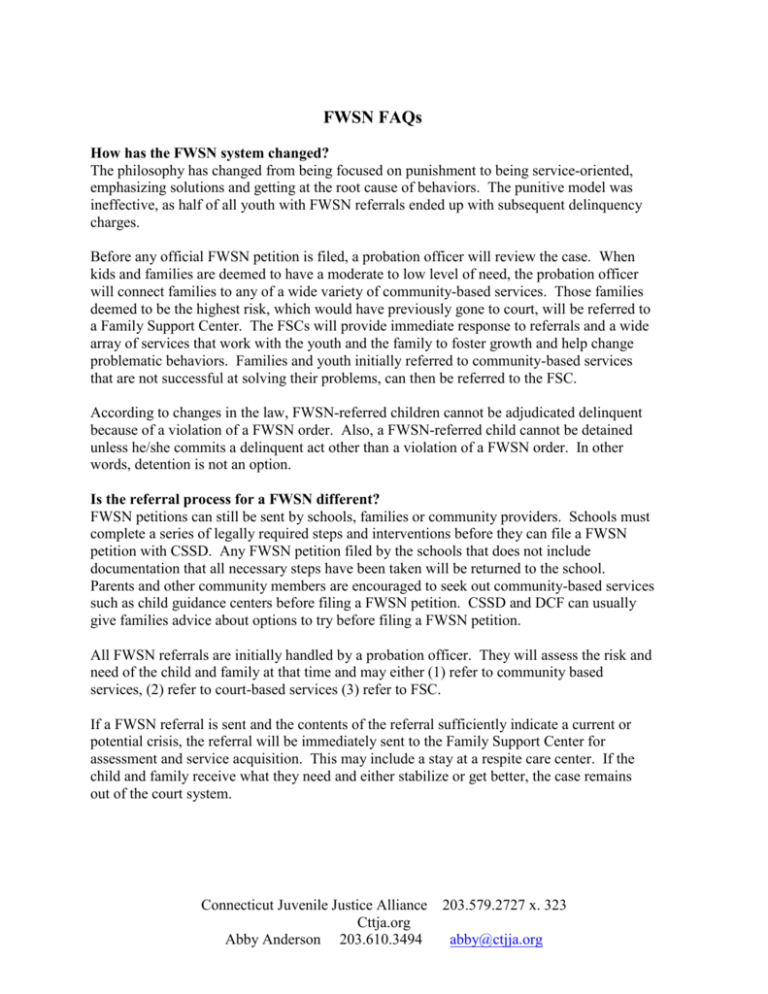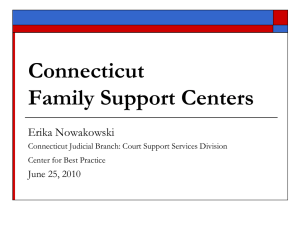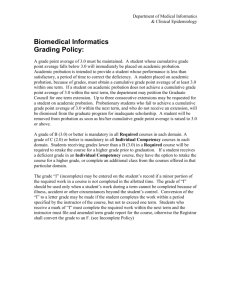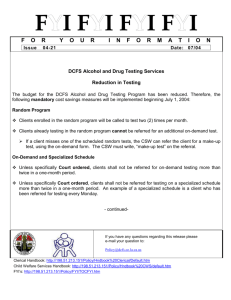factsheet-FWSN.doc - The Connecticut Juvenile Justice Alliance
advertisement

FWSN FAQs How has the FWSN system changed? The philosophy has changed from being focused on punishment to being service-oriented, emphasizing solutions and getting at the root cause of behaviors. The punitive model was ineffective, as half of all youth with FWSN referrals ended up with subsequent delinquency charges. Before any official FWSN petition is filed, a probation officer will review the case. When kids and families are deemed to have a moderate to low level of need, the probation officer will connect families to any of a wide variety of community-based services. Those families deemed to be the highest risk, which would have previously gone to court, will be referred to a Family Support Center. The FSCs will provide immediate response to referrals and a wide array of services that work with the youth and the family to foster growth and help change problematic behaviors. Families and youth initially referred to community-based services that are not successful at solving their problems, can then be referred to the FSC. According to changes in the law, FWSN-referred children cannot be adjudicated delinquent because of a violation of a FWSN order. Also, a FWSN-referred child cannot be detained unless he/she commits a delinquent act other than a violation of a FWSN order. In other words, detention is not an option. Is the referral process for a FWSN different? FWSN petitions can still be sent by schools, families or community providers. Schools must complete a series of legally required steps and interventions before they can file a FWSN petition with CSSD. Any FWSN petition filed by the schools that does not include documentation that all necessary steps have been taken will be returned to the school. Parents and other community members are encouraged to seek out community-based services such as child guidance centers before filing a FWSN petition. CSSD and DCF can usually give families advice about options to try before filing a FWSN petition. All FWSN referrals are initially handled by a probation officer. They will assess the risk and need of the child and family at that time and may either (1) refer to community based services, (2) refer to court-based services (3) refer to FSC. If a FWSN referral is sent and the contents of the referral sufficiently indicate a current or potential crisis, the referral will be immediately sent to the Family Support Center for assessment and service acquisition. This may include a stay at a respite care center. If the child and family receive what they need and either stabilize or get better, the case remains out of the court system. Connecticut Juvenile Justice Alliance Cttja.org Abby Anderson 203.610.3494 203.579.2727 x. 323 abby@ctjja.org Do the changes mean that there are no consequences for a youth’s misbehavior? Detention is the only “consequence” that is no longer an option. Federal laws prohibit the detainment of status offenders in locked or secure detention centers across the country. This legislative session simply closed the loophole which often resulted in FWSN violators being detained. There are consequences for youth who continue to misbehave seriously. The new services and programs offered to support the changes in the FWSN legislation are designed to work with the family and youth to determine WHY the behavior is occurring instead of focusing just on the behavior. When a child is skipping school, or running away or acting out of control -- there is a reason. The probation officer and service providers will work with the family and youth to find those reasons and address them as effectively as possible. This system change reflects the emerging understanding that detention is not the answer for children who skip school, misbehave at home, or who run away. These children need interventions and services to help them self-manage as well as programs that work with all family members to address and change the child’s behavior over time. What happens to youth who don’t comply with the services and treatment offered through the probation officer or Family Support Center? If the behavior escalates and continued efforts fail, the case can be referred back to the probation department for actual filing. The courts can determine that an out-of-home placement is necessary and refer the child to a maximum 45-day facility run by the judicial Court Support Services Division (CSSD) or/and commit the child to the Department of Children and Families (DCF). The CSSD-run FWSN Centers will hold 6 girls and 6 boys. The girls’ facility is currently operating out of New Haven and the location and contracted provider for the boys’ facility is still being determined. What’s different about the services offered now? Many of the same services are being offered through DCF voluntary services and CSSD contracted providers. Importantly, though, more of these services are being offered to youth who are FWSN-identified and not just those youth in the juvenile justice population. The Family Support Centers do offer a different array of services than have been available in the past and are designed specifically for FWSN children and families. Two completely new services include crisis intervention that is available 24 hours a day, 7 days a week and family mediation. What is a Family Support Center? Family Support Centers operate in Bridgeport, Hartford, New Haven and Waterbury to: Make contact with families within 24 hours of referral Begin assessment with youth and families within 48 hours after initial contact Complete initial case planning with the youth and family Provide and broker services including: o Crisis intervention (24/7) o Family mediation o Educational Advocacy o Referrals to existing community services o Referrals to respite o Access to flex funds Connecticut Juvenile Justice Alliance Cttja.org Abby Anderson 203.610.3494 203.579.2727 x. 323 abby@ctjja.org When will Family Support Centers be available for everyone? The Family Support Centers are operating in Bridgeport, Hartford, New Haven and Waterbury. Funding for six additional Family Support Centers to serve the remaining court communities across the state is requested from the legislature in the 2008 session. How do you get access to Family Support Centers? Once a FWSN referral is made, the probation supervisor reviews the referral for sufficiency. Those youth and families deemed to have the greatest need of services will be referred to the Family Support Centers immediately. Youth and families with a lower level of perceived need will meet with a probation officer who will assess and provide access to communitybased services through the community, CSSD and/or DCF Voluntary Services. If those options prove unsuccessful, the family can then be referred to the Family Support Center. What type of respite facilities are available and for how many youth? Respite facilities are available for children throughout the state, not just those in communities with a Family Support Center. There are currently 12 respite beds available for girls (6 in Waterbury and 6 in New Haven) and there will be 6 respite beds in New Haven available for boys in early 2008. What are the additional needs of this service continuum? The Family Support Center model must be expanded to the 6 additional court communities in order for the system to be available statewide and to be in compliance with state law. There must be more and broader services available to children who do not go to the Family Support Centers and there must be a greater emphasis on prevention planning. There must be more access to flexible funding and truancy prevention and intervention programming must be expanded. Legislators and policy makers need to know that this is what the public wants and how they want budget dollars allocated. What is the role of DCF FWSN liaisons in the new system? The DCF FWSN liaisons play a vital role in ensuring that the probation officer has all of the information about the child and family necessary to develop an effective treatment plan. The FWSN liaison is also familiar with the services and programs available in the community and helps facilitate access to those and DCF voluntary services. How will CSSD know if the new system is working? Can community members be involved in ensuring this system achieves the goals it is designed to achieve? Local Implementation Teams are being formed in each community to ensure proper coordination between CSSD, DCF and local schools, communities and service providers in implementing the new FWSN system. This team will be responsible for educating the community about the new process, identifying challenges in implementation and presenting those challenges to the FWSN Advisory Board. Each community will determine its own meeting schedule and membership qualifications. Connecticut Juvenile Justice Alliance Cttja.org Abby Anderson 203.610.3494 203.579.2727 x. 323 abby@ctjja.org






